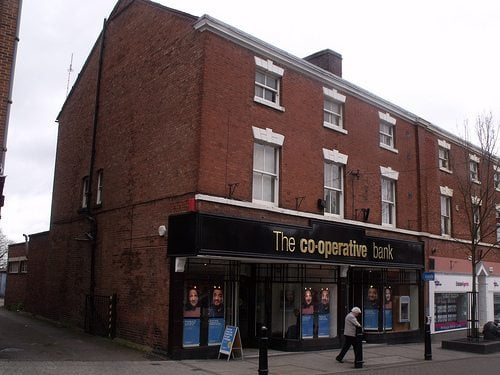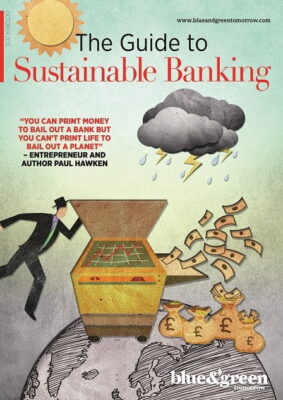

Economy
The Co-op Bank has been spiky, fearless and political; it’s imperative it remains ethical
Amidst The Co-operative Bank’s financial problems and the scandals and political mudslinging of recent weeks, it’s easy to forget how much of a pioneer the bank has been. As an antidote to the cynicism, we present The Co-operative Bank’s Greatest Hits.
Ahead of Friday’s crucial deadline for bondholders voting on whether to accept the Co-operative Bank’s rescue package, Ryan Brightwell writes how customer power could be the difference over whether it remains ethical.
After the most scandal-ridden fortnight in the Co-operative Bank’s history, it’s difficult to believe that only eight months ago the bank seemed on the edge of a breakthrough. The Project Verde deal held out the chance of a shift from a ‘niche ethical player’ to a major force in British banking, with over 1,000 branches, co-operatively owned and with a hard-edged ethical policy in place.
For those who applauded what the bank stood for, it was a dizzying proposition. We knew it would be difficult – four years after the merger with Britannia, they still felt like two different businesses – but those in charge of running the numbers told us it could be done.
Fast forward to the present day, and not only have the expansion plans been shown to be wildly hubristic given the bank’s financial position, but its reputation has been taken a severe blow courtesy of the Paul Flowers scandal, and its future hangs in the balance.
The crucial deadline for bondholders voting on whether to accept the rescue package is this Friday. If investors reject the plan, the alternative is likely to be ‘resolution’, or takeover by the Bank of England, with dire consequences according to the Co-operative Group. If it accepts then there will be rapid movement to seal the deal with the hedge funds.
The Save Our Bank campaign was set up to ensure that the bank’s ethical policy remains in place whatever happens, and to help the bank eventually return to co-operative ownership. We want to make sure that the hedge funds set to take over 70% of the bank will be tied in to keeping not only the policy but the external auditing and transparent reporting that will help make sure it stays robust.
The news of recent weeks has led some to take the view that this all goes to show that the banks are all as bad as each other. That would be to ignore the extent to which the Co-operative Bank has campaigned hard, and often with considerable success, on issues that few other companies, let alone banks, dare to go near. In contrast to the ‘cuddly’ tag given to it by commentators who were not paying enough attention, the Co-operative Bank at its best has been spiky, fearless and political.
Evidence of this can be seen in the bank’s campaign for international bans on both landmines and cluster munitions – bans which are now in place. Its 2002 campaign on cluster munitions involved not just raising finance for mine clearance in warzones, but funding and putting its name to new research on the humanitarian impacts of these indiscriminate weapons.
More recently in 2006, the bank backed Friends of the Earth’s Big Ask campaign, as a result of which every MP in the land received a letter from a Co-operative Bank customer urging them to support strong climate legislation.
The bank’s campaign to stop tar sands extraction in Canada, like the cluster munitions campaign, began with funding new research to understand the problems in detail. It also involved backing a legal challenge by the indigenous Beaver Lake Cree Nation against the oil companies to stop drilling on their territory.
And of course, it has been the ethical policy itself which has given the bank legitimacy to campaign on these topics. It was back in 1992 that the bank first polled its customers on where they did and didn’t want their money to go, resulting in a policy of denying finance to, among others, manufacturers of arms for oppressive regimes, companies involved animal testing for cosmetics and those failing to uphold basic human rights.
Since then the policy has been updated several times, including in 1998 when it was extended to exclude the fossil fuel industry, an early precursor the fast-growing fossil fuel divestment campaign of today. And the bank has withheld well over £1 billion to businesses which fail to meet these standards – standards backed overwhelmingly by its customers.
Let’s not forget these genuine achievements and others, which stand in stark contrast to the record of the rest of the banking sector. (To pick just one example among many, the World Development Movement showed just last month how all of the big five British banks – HSBC, Barclays, Standard Chartered, RBS and Lloyds – are complicit in fuelling climate change and destroying communities through their financing of an Indonesian coal boom.)
And talking of stark contrasts, let’s not forget that HSBC’s chairman at the time the bank was found to be laundering money for Mexican drug cartels, Stephen Green, has been made Lord Green and now sits as trade minister.
Thousands of customers have signed up to the Save Our Bank campaign so far, while 20 charities and campaigning organisations have backed our declaration on the ethical policy. If we can reach a critical mass of customers, we can help influence the outcome, and help save what made the Co-operative Bank head and shoulders better than the rest.
To help secure the bank’s ethical policy please sign up with Save Our Bank before Friday’s crucial vote.
Ryan Brightwell is a researcher with BankTrack, founder of the research consultancy Bright Analysis and a former employee of the the Co-operative Group.
Further reading:
Campaign group to Co-op customers: ‘don’t switch yet; let’s stick together’
Co-op Bank says ethics are in its constitution – but should we believe it?
Former Co-op Bank chairman Paul Flowers arrested
Co-op Bank to close 15% of branches, as hedge funds take control

































